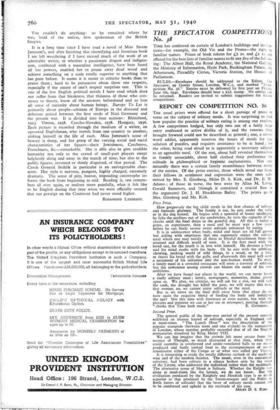REPORT ON COMPETITION NO. 36 THE usual prizes were offered
for a short passage of prose or verse on the subject of solitary meals. It was surprising to find how popular the practice of solitary eating is among our readers. A few competitors hedged, but only two out of a fairly large entry confessed to active dislike of it, and the reasons they brought forward could not be described as general ; one, a cross- word addict, apparently reserves the hours of meals for the solution of puzzles, and requires assistance to be at hand ; for the other, being read aloud to is apparently a necessary adjunct to an agreeable meal. Of the rest, about half revealed themselves as frankly unsociable, about half clothed their preference for solitude in philosophical or hygienic explanations. Not un- naturally there was a certain family resemblance between many of the entries. Of the prose entries, those which stood out from their fellows in sentiment and expression were the ones sub- mitted by Mrs. E. Ginsberg, Miles D. S. Kirk, and Dr. E. W. Adams ; of those in verse, the best were by Allan M. Laing, Gerald Summers, and (though it contained a crucial flaw :n the argument) Dr. J. H. Shackleton Bailey. The prizes go to
Mrs. Ginsberg and Mr. Kirk.
First Prize.
How gorgeously the big child revels in his first chance of solitary and fantastic gluttony. The family is out, he eats under the table or in the dog kennel. He begins with a spoonful of honey unalloyed, he licks the sardines out of the sandwiches, he tests the capacity of his cheeks until the food drops to the grateful dog. All this is rather a game, an experiment, than a meal and he must wait a few years before he can finely savour sweet solitude enhanced by eating. It is in adolescence when body, mind and heart are all full grown but aching with emptiness that one supremely enjoys the solitary meal where one may satisfy all three in blissful detachment from the strained and difficult world of men. It is the first meal with the loved one, for the youth is in love with himself. He devours a book and his mind exults with his body. Or he eats with the nibbling, chewing, pecking world of wild things, in a wood, or by a lake, or shares his bread with the gulls, and afterwards this meal will seem a sacrament of his initiation into the non-human world. To most, a lonely meal in a crowded restaurant will seem a travesty of solitude, but the newcomer among crowds can blazon the scene of his own ambitions.
After we have found our places in the world, we can never know a really solitary meal ; letters, newspapers, memories, duties crowd upon us. We plan, we criticise, we will ask for a rise, we will sack the cook, the drought has killed the peas, we will marry this mar., that woman, no, we cannot enjoy solitude or the meal.
But as we move on the final drift away from that place do we taste again the exquisite blend of feeding the body and indulging the ego? Not this time with literature or even nature, but with the pictures and patterns we can at last see in retrospect, peering through
chinks that Time hath made." E. GINSBERG.
Second Prize.
The general public of the inter-war period of the present century exhibited an intense hatred of solitude, especially in England and at meal-times. " The Lunch Hour" was the description of the popular stampede (between noon and one o'clock) to the restaurants of London, whose number probably exceeded that of all the Enghsh monasteries dissolved by King Henry VIII. We can but imagine that the crowds felt more secure from the menace of Thought, so much distrusted at that time, when they could assemble in overheated and under-ventilated halls to eat mass- produced and badly cooked food to the accompaniment of ms reminiscent either of the Congo or of what was called gay Viei, It is interesting to study the totally different outlook of the medic . al west and of the modern Asiatics. The monk, even in the conventual refectory, had been solitary in a silence broken only by the voice of the Lector, who addressed the individual rather than the multitude The alternative name of Monk is Solitary. Whether the Knight IA at alone at meal-times like the hermit, we do not know. But the civilisation produced by the Knightly and Monkish type is so mi superior to that produced by the Storm-trooper and the Politic in (both haters of solitude) that the lover of solitary meals cannot .111 to be comforted and upheld in the rectitude of his case.
Mims D. S. Kriu






























 Previous page
Previous page